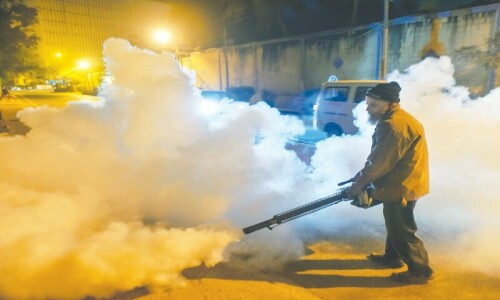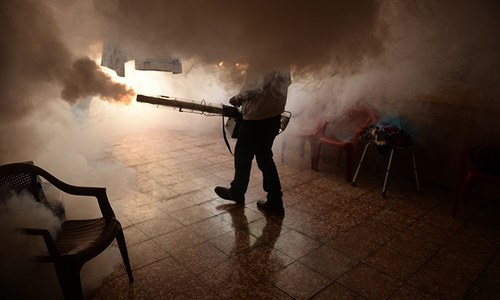KARACHI: The tragic death of two children, who passed away after fumigation was carried out in the Defence Housing Authority (DHA) home a couple of days ago, sparked serious safety concerns over the insecticide spray in closed spaces.
Both the children under the age of 10 were part of a seven-member family that fainted after inhaling insecticide fumes sprayed at their home. The grief-stricken family is not willing to talk about their ordeal even with police for obvious reasons.
“They haven’t done the funeral of their baby [girl] yet…said not to bother for a few days as they are in mourning and few of their family members are still hospitalised,” DIG-South Syed Asad Raza told Dawn when asked whether any headway was made in the investigations.
In the wake of this recent incident, Dawn reached out to registered and established fumigation companies to gain insight into how deaths occur due to this process and how such consequences can be avoided.
People advised not to use any part of a floor that has been fumigated for at least 24 hours
They are of the view that fumigation is neither a new process nor an unfamiliar term and it has been carried out across the country in both commercial and residential settings. While standard operating procedures (SOPs) and laws exist and are largely followed, the process itself is highly sensitive and it is crucial to recognise this sensitivity, especially when lives are at stake.
“What people have been doing for a while is getting partial areas of their houses fumigated while continuing to use the other parts, even though it is strictly advised not to use any part of a floor that has been fumigated for at least 24 hours,” said Muhammad Asif from the Unique Fumigation Services, a company that has been in business for over 10 years.
“This instruction is even stricter for infants, children under the age of 10, pregnant women, and elderly people, who should avoid the house for at least two to three days until the smell is completely gone,” he added, advising residents to check for allergies or potential reactions before having their houses fumigated.
Talha Altaf from the Pakistan Fumigation Services echoed Mr Asif’s statements, adding that aluminium phosphide, a highly toxic crystalline solid used as a pesticide, fumigant, and igniting agent, is banned for use in residential fumigation.
“There is little to no awareness about the ban, which is why it is still widely used in residential fumigation. Clients are often unaware of this, and inexperienced companies continue to use it. The chemical is strictly intended for commercial purposes, not residential use,” he said.
“Awareness is crucial, yet unfortunately lacking when it comes to the fumigation process. People have their houses treated with chemicals that are either banned or highly toxic to human life. This is no trivial matter; it is high time we start taking people’s lives seriously,” he said.
Adverse effects of aluminium phosphide
According to the website of the National Institutes of Health of the United States, inhaling aluminium phosphide can lead to immediate and severe health issues, affecting multiple organ systems. It can irritate the nose, throat, and lungs, causing symptoms such as coughing, wheezing, shortness of breath, and chest tightness, which may escalate to acute respiratory distress syndrome (ARDS) in severe cases. Cardiovascular complications, including abnormal heart rhythm, heart failure, and shock, are also possible. Additionally, exposure may result in nausea, vomiting, diarrhoea, stomach pain, fever, tremors, weakness, dizziness, and incoordination. Prolonged or repeated exposure increases the risk of damage to vital organs such as the lungs, kidneys, and liver, making it a highly dangerous substance to handle.
The Agricultural Pesticides Ordinance 1971 also discourages the use of phosphide as it has severe health hazards, and it also has the ability to produce phosphine gas when it comes into contact with water or acid. Phosphine gas is also highly toxic and can act as a respiratory and mitochondrial poison.
Imtiaz Ali in Karachi also contributed to this report
Published in Dawn, December 15th, 2024














































